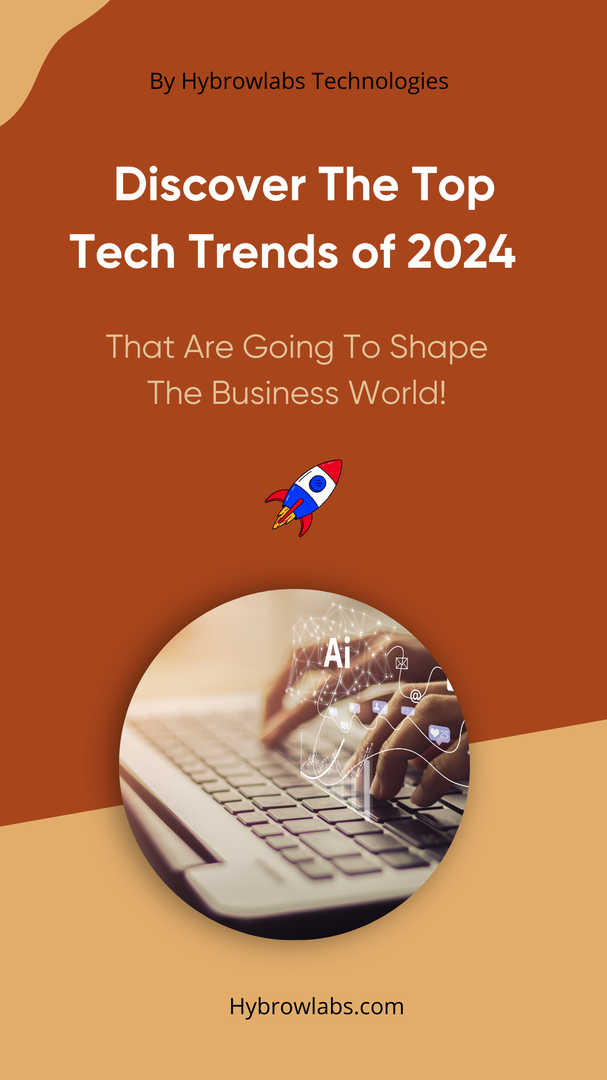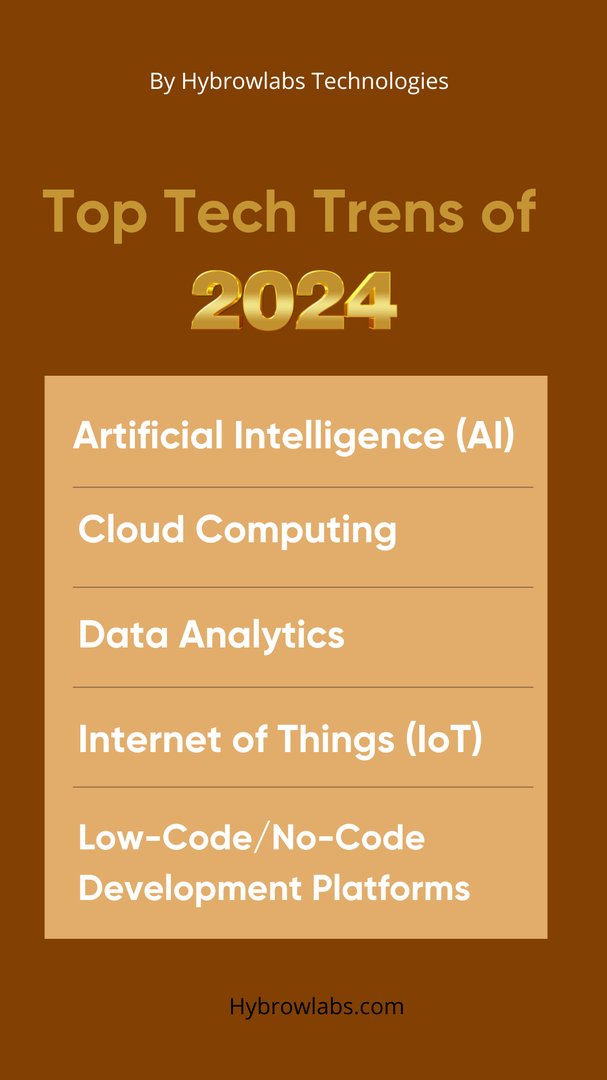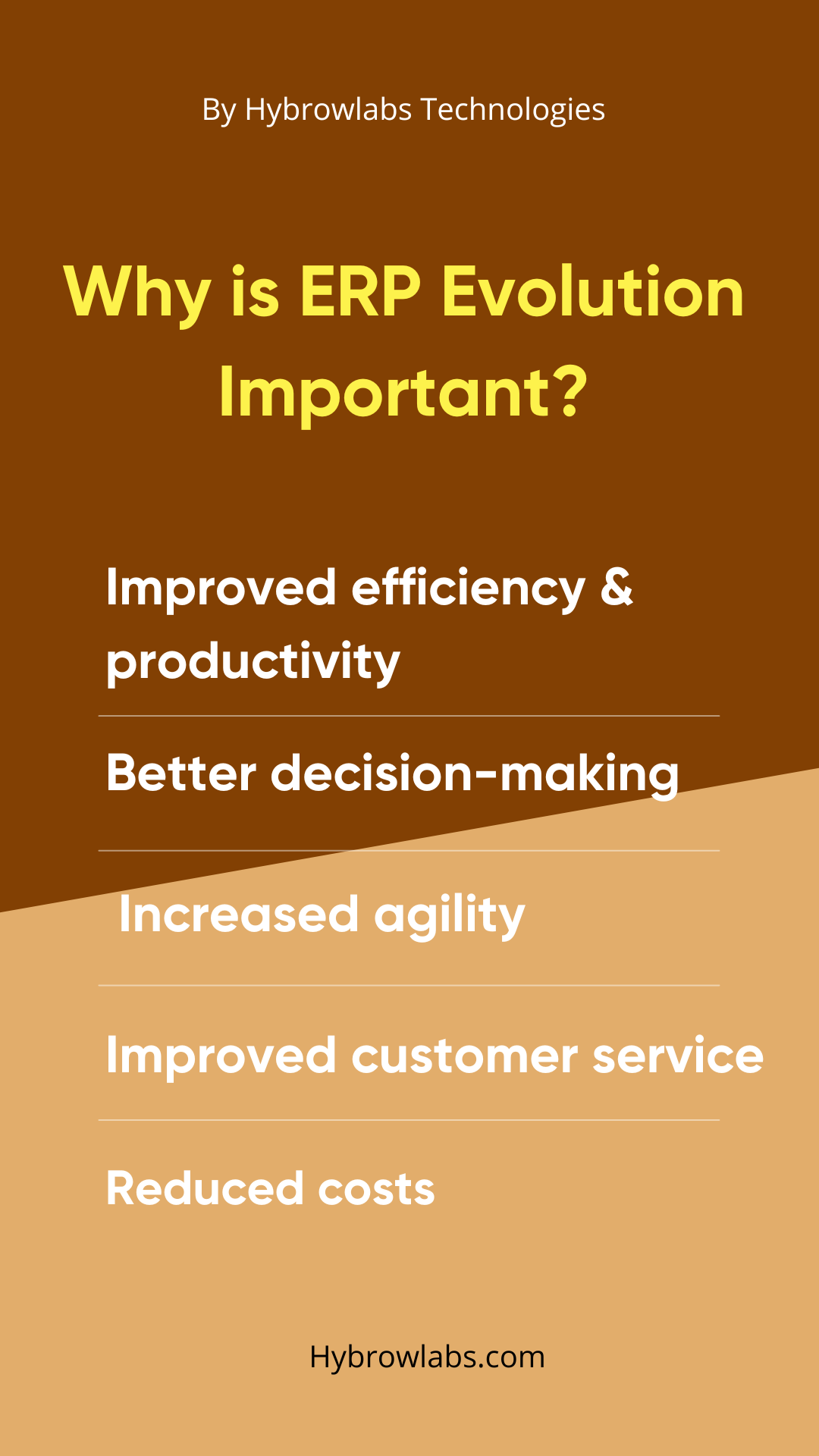In the quickly changing era of technology, the future is always knocking at our digital door. As we are closer to the year 2024, the speed of change shows no sign of slowing down; instead, it's accelerating like never before. The tech world is transforming dramatically, with Artificial Intelligence (AI) disrupting businesses & the continuous march of digitization. But what makes 2024 so special? It's not just another year on the calendar; it's a crossroads where innovation meets necessity. The stage is set for a transformative journey that will redefine the way businesses operate & at the heart of it all is the evolution of Enterprise Resource Planning (ERP) systems.
In this blog, we will discuss deeply the tech trends that will shape 2024 & beyond. It's a gateway to action. If you're intrigued by these tech trends & want to harness their power for your business, stay tuned.

What is digital transformation?
Digital transformation is the procedure of using technology to fundamentally change the way a business works. It is about more than just executing new technologies; it is about reimagining the way a business provides value to its customers. If you're not sure what digital transformation is or why it's important, check our previous blog post: Simplifying Digital Transformations with ERP Software.
The top tech trends to watch for in 2024:

In the ever-evolving landscape of enterprise technology, the backbone of business operations—Enterprise Resource Planning (ERP)—is undergoing a profound transformation. As we are training to look into the future, five remarkable tech trends are at the forefront, revolutionizing the way organizations operate, make decisions & scale for success.
Now, let’s discuss deeply these transformative trends, each with its unique role in the evolution of ERP systems. From harnessing the power of Artificial Intelligence (AI) to the cloud's vast possibilities, from the data-driven insights of analytics to the real-time connectivity of the Internet of Things (IoT) & the democratization of development through low-code/no-code platforms—these trends collectively redefine what ERP means in the digital era. So let’s see
Trend 1: Artificial Intelligence (AI)
Artificial Intelligence (AI) is transforming the ERP landscape by introducing advanced automation & intelligent decision-making capabilities. Here's how AI is reshaping ERP processes:
- Automating and Streamlining ERP Processes: AI is helping to automate routine tasks within ERP systems. For example, AI-powered chatbots can handle customer inquiries, reducing the workload on support teams. Additionally, AI-driven robotic process automation (RPA) can streamline data entry & processing, improving efficiency.
- Improving Decision-Making and Forecasting: AI-driven analytics & machine learning algorithms enhance decision-making by providing insights based on data patterns. ERP systems are now equipped to offer predictive analytics, helping businesses make more informed decisions & anticipate future trends & demands.
- Developing New and Innovative ERP Solutions: AI is driving the development of next-gen ERP solutions. These systems can adapt to changing conditions, predict maintenance needs in manufacturing & even automate procurement decisions. AI-driven ERP is at the forefront of innovation in business technology.
Trend 2: Cloud Computing
Cloud computing has revolutionized ERP by delivering accessibility, scalability & flexibility. Here's how:
- Making ERP More Accessible and Affordable: Cloud-based ERP systems eliminate the requirement for costly on-deduction infrastructure. They can be accessed from anywhere with an internet connection, making ERP accessible to businesses of all sizes.
- Improving Scalability and Flexibility: Cloud ERP solutions can scale up or down as needed, making them ideal for growing businesses. They offer flexibility to adjust resources, such as storage & computing power, according to changing requirements.
- Enabling New ERP Features and Functionality: The cloud allows ERP providers to roll out updates & new features seamlessly. This means businesses benefit from the latest capabilities without the hassle of traditional software upgrades.
Trend 3: Data Analytics
Data analytics plays a pivotal role in enhancing ERP by providing valuable insights & improving operational efficiency. Data analytics is the magic wand turning your ERP into a decision-making powerhouse:
- Improving ERP Reporting and Insights: Data analytics tools integrated into ERP systems enable real-time reporting & dashboards. This empowers users to monitor key performance indicators & gain actionable insights into their operations.
- Identifying New Opportunities and Trends: Advanced analytics techniques like predictive & prescriptive analytics, help organizations identify emerging trends, customer preferences & market opportunities. ERP systems equipped with data analytics can steer businesses toward growth.
- Enhancing Operational Efficiency and Effectiveness: Data analytics optimizes processes within ERP systems. It can help in demand forecasting, inventory management & supply chain optimization. This will lead to cost savings & improved efficiency.
Trend 4: Internet of Things (IoT)
The Internet of Things (IoT) is helping to tie ERP systems to real-time data sources, revolutionizing the supply chain & manufacturing processes. Here's how IoT is influencing ERP:
- Connecting ERP to Real-Time Data Sources: IoT sensors & devices collect vast amounts of real-time data, which can be integrated with ERP systems. This connectivity enables ERP to respond dynamically to changing conditions & demand.
- Automating and Streamlining Supply Chain and Manufacturing: IoT-driven automation enhances supply chain & manufacturing processes. ERP systems can receive data from sensors on machines, vehicles & inventory, allowing for proactive maintenance, route optimization & just-in-time production.
- Developing New ERP Solutions: IoT is a catalyst for innovative ERP solutions. These systems can leverage IoT data for predictive maintenance, quality control & even creating personalized customer experiences.
Trend 5: Low-Code/No-Code Development Platforms
Low-code/no-code development platforms democratize ERP development, making it more accessible & agile. Here's how:
- Customizing and Extending ERP Systems: Low-code/no-code platforms empower businesses to customize & extend their ERP systems without extensive coding expertise. Users can create tailored workflows, reports & integrations to meet their specific needs.
- Developing New ERP Solutions without Coding: These platforms enable businesses to develop entirely new ERP solutions or modules without traditional coding. This accelerates development cycles & allows organizations to respond quickly to changing requirements.
- Democratizing ERP Development: By reducing the barrier to entry for ERP development, low-code/no-code platforms make it possible for a broader range of users within an organization to participate in creating & maintaining ERP solutions, fostering innovation.
Why is ERP Evolution Important?

Enterprise Resource Planning (ERP) evolution is critically important because it represents the adaptation & enhancement of a core technology framework that underpins the operations of countless businesses worldwide. ERP systems serve as the backbone for managing & integrating various aspects of an organization's functions, including finance, human resources, supply chain, inventory, manufacturing, sales & customer relationship management.
Here are some of the key benefits of ERP evolution:
1. Improved efficiency and productivity:
ERP systems can help businesses to automate & streamline their operations, which can lead to significant improvements in efficiency & productivity.
2. Better decision-making:
ERP systems provide businesses with a real-time view of their data, which can help them to make better decisions about their processes & approaches.
3. Increased agility:
ERP systems can help businesses to adapt to change more quickly & easily. This is important in today's rapidly changing business environment.
4. Improved customer service:
ERP systems can help businesses to enhance their customer service by supplying them with a better insight into their customers' requirements & preferences.
5. Reduced costs:
ERP systems can help businesses to reduce their costs by automating & streamlining processes & by improving efficiency & productivity.
Overall, ERP evolution is important because it helps businesses to improve their operations, gain a competitive advantage & deliver better value to their customers.
Here are some specific examples of how ERP evolution is helping businesses to succeed:
- A manufacturing company is using AI-powered ERP to automate its production planning & scheduling process. This has helped the company to reduce its production costs & improve its delivery times.
- A retail company is using cloud-based ERP to manage its inventory & sales across its multiple channels. This has helped the company to improve its customer service & increase its sales.
- A healthcare company is using data analytics to identify new trends in patient care. This has helped the company to develop new services & improve the quality of care it provides.
- A logistics company is using IoT to track its shipments in real time. This has helped the company to improve its customer service & reduce its delivery costs.
How are tech trends driving digital transformation and ERP evolution?
Tech trends are helping businesses to make their ERP systems more intelligent, efficient & adaptable. This enables businesses to accelerate their digital transformation efforts & achieve their business goals. Tech trends are driving digital transformation & ERP evolution in a number of ways. For example:
1. Artificial intelligence (AI):
Artificial intelligence (AI) is automating & streamlining ERP processes, improving decision-making and forecasting & developing new and innovative ERP solutions. For example, AI-powered ERP systems can automatically generate reports, identify trends & predict future demand.
2. Cloud computing:
ERP is becoming more available & affordable only because of cloud computing. This is also enabling new ERP features & capabilities. For instance, cloud-based ERP systems can be flexibly scaled up or down to match changing business demands & can be attainable from anywhere with an internet connection.
3. Data analytics:
Data analytics are improving operational effectiveness & efficiency while also finding new opportunities & trends. Data analytics, for instance, is identifying which items are selling well, which clients are most profitable & which parts of the company are operating most effectively.
4. Internet of Things (IoT):
IoT is assisting in developing new and creative ERP solutions, automating & streamlining supply chain & industrial operations, and connecting ERP systems to real-time data sources. For instance, IoT-enabled ERP systems may automate production planning & scheduling, track inventory levels in real-time, and forecast maintenance requirements.
5. Low-code/no-code development platforms:
Low-code/no-code development platforms are making it easier for businesses to customize & extend their ERP systems & to develop new ERP solutions without the need for coding expertise. For example, low-code/no-code development platforms can be used to create custom workflows, reports & dashboards.
Conclusion:
As the digital transformation journey unfolds, remember that your ERP system is not a static entity; it's your bridge to a more efficient, intelligent & adaptable future. Embrace these tech trends, envision the possibilities & let your ERP system lead the way into the ever-evolving landscape of business technology.
In the end, it's not just about ERP; it's about your organization's readiness to thrive in a tech-driven world. So, gear up, stay curious & be prepared to seize the limitless potential that ERP evolution brings to your business.
Don't wait; start your proactive digital transformation journey with these top tech trends today! And here in this journey, Hybrowlabs can be your trusted navigator. Join us as we undertake this exciting adventure toward a brighter & more innovative future. The possibilities are endless & they all begin with a single step.
Are you ready to transform your business? Let's get started today!
FAQ:
1. How can low-code/no-code development platforms benefit businesses in ERP customization?
Low-code/no-code platforms make it easier for businesses to customize & extend their ERP systems without the need for extensive coding expertise. This speeds up development, empowers users & fosters innovation.
2. Is ERP evolution a one-time process, or should businesses continuously update their systems?
ERP evolution is an ongoing process. Businesses should continuously update their systems to keep pace with technological advancements, changing business needs & to remain competitive in their industries.
3. How can a business start implementing these ERP trends in their operations?
Implementing ERP trends involves a strategic approach. It begins with evaluating your current ERP system, identifying areas for improvement & selecting the right technology solutions & partners to implement these trends effectively.
4. How does data analytics improve ERP reporting and insights?
Data analytics within ERP systems provides real-time dashboards & reports, offering businesses actionable insights into their operations. It helps organizations monitor key performance indicators & make informed decisions.
5. What role does the Internet of Things (IoT) play in ERP evolution?
IoT connects ERP systems to real-time data sources, enabling automation, data-driven decision-making & new solutions. It enhances supply chain management, manufacturing processes & predictive maintenance.



c4256e.png)


a3dc85.jpg)

.jpg)
fd8f11.png)

.jpg)
.jpg)